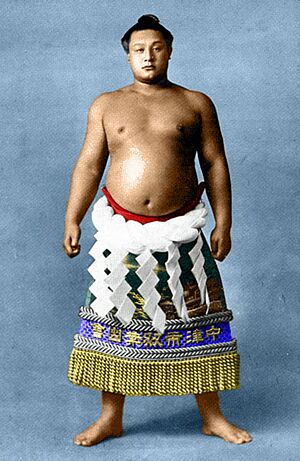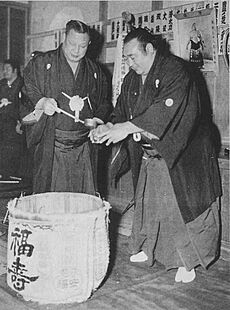Futabayama Sadaji facts for kids
Quick facts for kids Futabayama Sadaji |
|
|---|---|
| 双葉山 定次 | |

Futabayama, circa 1940
|
|
| Personal information | |
| Born | Akiyoshi Sadaji February 9, 1912 Usa, Oita, Japan |
| Died | December 16, 1968 (aged 56) |
| Height | 1.79 m (5 ft 10 in) |
| Weight | 128 kg (282 lb; 20.2 st) |
| Career | |
| Stable | Tatsunami |
| Record | 345-113-33 (1 draw) |
| Debut | March 1927 |
| Highest rank | Yokozuna (May 1937) |
| Retired | November 1945 |
| Elder name | Tokitsukaze |
| Championships | 12 (Makuuchi) |
| Gold Stars | 1 (Musashiyama) |
| * Up to date as of June 2020. | |
Futabayama Sadaji (双葉山 定次, February 9, 1912 – December 16, 1968) was a famous Japanese sumo wrestler from Oita Prefecture. He joined sumo in 1927. He was the 35th Grand Champion (yokozuna) of sumo, holding the title from 1937 until he retired in 1945.
Futabayama won 12 major tournaments (called yūshō). He also holds the all-time record for the longest winning streak: 69 matches in a row! Even though he was so dominant, people loved watching him. After retiring, he became a top coach and later led the Japan Sumo Association, which runs the sport.
Contents
Futabayama's Amazing Sumo Career
Born Akiyoshi Sadaji in Usa, Japan, he started working on fishing boats when he was just a boy. He joined professional sumo in March 1927, at age 15. He was recruited by the Tatsunami stable, which is like a sumo training club.
Rising Through the Ranks
Futabayama quickly moved up the ranks. He reached the top sumo division, called makuuchi, in early 1932. This happened partly because many top wrestlers went on strike. The Japan Sumo Association needed new wrestlers to fill their spots. But Futabayama soon showed he belonged there. He finished second in his very next top division tournament.
The Unbeatable Streak
Futabayama is most famous for his incredible winning streak. He won 69 sumo matches in a row! This is a record that still stands today. It means he was unbeaten for over three years. In sumo, matches often last only a few seconds. A small mistake can lead to a loss. So, winning 69 times in a row is an amazing achievement.
His streak began on January 7, 1936. During this time, he was promoted all the way to yokozuna, the highest rank. People were so excited that the Sumo Association made tournaments longer. They went from 11 days to 13, then to 15 days.
His streak finally ended on January 3, 1939. He was defeated by a wrestler named Akinoumi Setsuo, who later also became a yokozuna. Futabayama was actually sick with a stomach illness at the time. So, he lost more because of his health than because his opponent was better.
Tournament Wins and Hidden Secret
Futabayama won a total of 12 tournament championships. Back then, there were only two tournaments each year. His record of 12 wins was the highest until the 1950s. That's when the number of tournaments increased to six a year. Even so, his percentage of wins compared to his career length is still very impressive.
After he retired, Futabayama shared a secret. He was actually blind in one eye! He had an injury when he was young. This makes his sumo achievements even more incredible.
He was also one of the first top wrestlers to marry someone who wasn't his stablemaster's daughter. He chose a wealthy heiress from a rich family.
Futabayama's Fighting Style
Futabayama was known for being great at the start of a sumo match. This is called the tachi-ai. He was an expert at receiving his opponent's charge and immediately countering it. People believe he never made a false start.
Even though he wasn't super big, he had amazing balance. One of his most feared moves was the uwatenage, which is an overarm throw.
Retirement and Leadership

Futabayama retired from sumo in November 1945. He said he didn't like the new, larger sumo ring (dohyō) that the American authorities wanted. But he had actually decided to retire a year earlier. He had lost a match to Azumafuji, another future yokozuna.
While still wrestling, Futabayama started his own sumo stable in 1941. This is not allowed anymore. After he retired, he changed its name to Tokitsukaze stable. It became one of the biggest sumo stables by the 1950s. Futabayama trained many strong wrestlers there. These included yokozuna Kagamisato and ōzeki Kitabayama and Yutakayama.
He led the stable until he passed away in 1968 from a liver illness. From 1957, he was also the chairman (rijichō) of the Japan Sumo Association. As chairman, he made important changes. He started giving monthly salaries to wrestlers in the top two divisions. He also set a mandatory retirement age of 65 for sumo elders and referees.
See also
- List of sumo record holders
- List of sumo tournament top division champions
- List of yokozuna
- Glossary of sumo terms
- List of past sumo wrestlers

